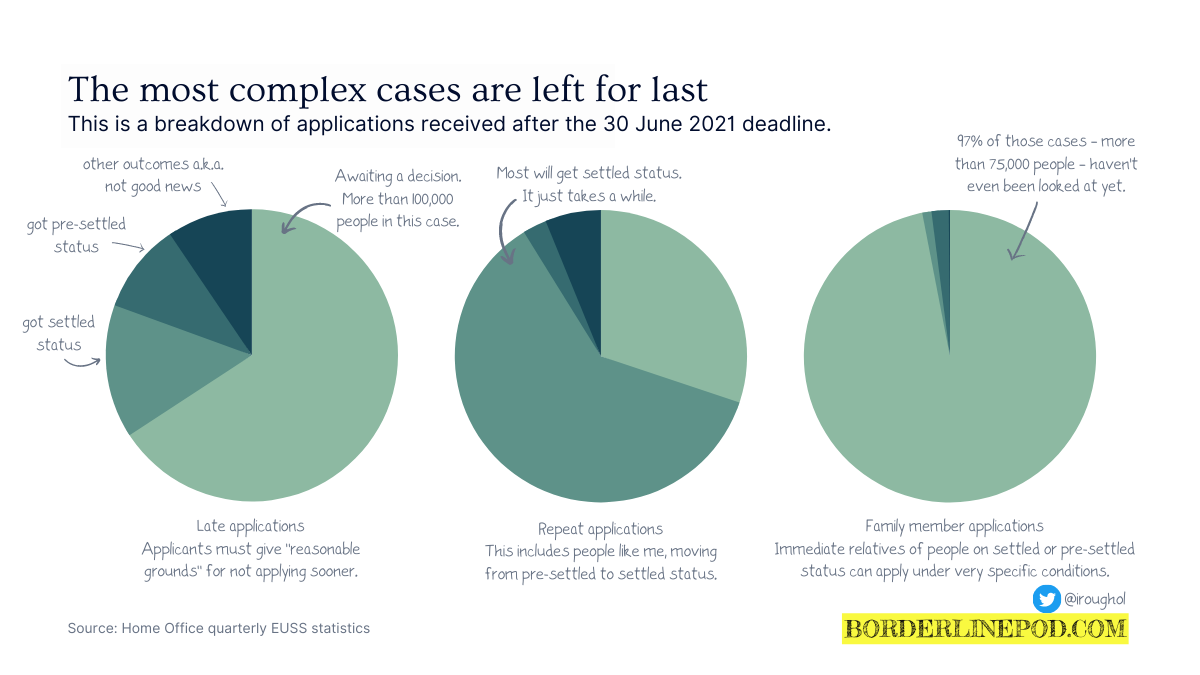
Why I've been waiting 100 days for settled status
The Home Office has massive backlogs and hundreds of thousands of people are waiting.
This weekend marked 100 days since I applied for settled status. I haven't heard a word from the Home Office. In February 2019 – the early testing phases of the programme – I applied for pre-settled status on a lunch break and got my answer before I had finished my coffee. So I got curious about what's happening this time...
What I found is a backlog of hundreds of thousands of application, a rate of review that has slowed to a crawl and negative outcomes going through the roof. So I made a bunch of charts.
A flood of applicants
It starts with a flood: Many more people availed themselves of the scheme than its creators and even its detractors had envisioned. During the Brexit campaign, we were told again and again there were 3 million EU citizens in the UK. That number even became the name of an advocacy group. But that was always a guesstimate. Living in a country without ID cards is great until you need to count people. The Home Office is notoriously bad at keeping track of who's who and where. (For evidence, just look to the Windrush scandal.) We have even less of a clue how many British citizens live in the EU, as the UK does not keep track of its expats.
So, 3 million, we were told. Except the scheme received 6,441,800 applications at last count. Remove repeat applicants and that's about 5.75 million people. Put it differently, that's 1 in 12 people in this country whose life story civil servants have to review to make a decision on whether they belong here.

While the deadline was 30 June 2021, applications are still coming in. Some are late first-timers who must justify why they didn't apply earlier. Others are re-applying after a negative outcome or they're like me, moving from pre-settled to settled status. Others still are family members of settled Europeans and entitled to join them. We'll get back to them later. Because we don't know how many eligible residents there are, we don't know how many applications could still come in or how many people will inadvertently lose their rights. Cases are likely to trickle in for years.
A trickle of decisions
That's the top of the funnel. What's happening at the bottom? The pace of review has been slowing to a crawl and the backlog has swollen to 315,000 applications. That's the stack my own application is sitting in.
In 2020, civil servants handed down about 5,600 decisions a day. This January, it was just over 2,200. While they manage to conclude more applications than they receive, the difference is so low – 12,770 in January – that the queue is barely moving. At this rate, the backlog of EUSS applications will clear in two years and 21 days.

To be fair, the number of new applications should trend down allowing for the pace to pick up. But there are also many reasons it could slow down even further.
One, the Home Office is busy. Regular migration flows are resuming as the pandemic quiets down. Civil servants are implementing a whole new points-based immigration system. They're managing the Windrush Compensation scheme, too little too late; the Afghan Resettlement Scheme, which isn't half of what was promised; and now the Ukraine Family Scheme, which is hardly promising either. Europeans could quietly take the back of the queue if it meant people in more dire situations were prioritised. They're not. Only about 50 visas have been issued to Ukrainian refugees, while the EU welcomes hundreds of thousands visa-free.
These are largely self-inflicted wounds. The Home Office wouldn't need to create "bespoke" immigration schemes for every crisis that arises if it applied refugee conventions as they were intended. The asylum backlog has skyrocketed under Priti Patel's tenure as Home Secretary. "She talks about the asylum system being broken," Colin Yeo told me in a recent episode. "But what she doesn't say is that she broke it."
4. Result is a growing backlog. This is new: it only started in 2018. Number waiting more than 6 months has trebled since Priti Patel became Home Secretary in 2019. pic.twitter.com/DilwWqzAQe
— Colin Yeo (@ColinYeo1) March 4, 2022
A surge of negative outcomes
Under-resourcing and a culture of always saying no before being forced to say yes is well documented at the Home Office. (I recommend my episode with Daniel Trilling about this.) That's bad news for people applying for settled status now and that's because of the second reason behind the backlog – their cases are more complex.
Pre-settled status is easy enough to get. You only need a single day of residence in the UK before 31 December 2020. But now people are moving to settled status and must prove they've been here 5+ years without leaving more than 180 days in any 12-month period. (I almost did accidentally because of frequent business trips. I keep a spreadsheet now and I've made one to share.) Or they're appealing a previous negative outcome. Or they're late and must show "reasonable grounds" for not applying sooner. Or they're sponsoring family members and must demonstrate the connection. All require mounds of documentation and manual review.

The system checks automatically against PAYE records (Pay As You Earn income tax, taken straight from payroll) so for the regularly and continually employed, approval takes minutes. But if you're unemployed or self-employed, on a career break, a young person in education or an elderly person who needs to fish paperwork out of a 40-year-old shoebox, things get complicated.
I'm a textbook case. In 2019, I was full-time corporate employee with two years of PAYE records in the system. I applied at 12:16 pm and got pre-settled status at 1:44 pm. Since then, I've gone self-employed, spent part of the pandemic lockdowns back in France and hit the five-year mark. Auto-checks failed. I had to send in council tax bills, income tax self-assessments and 18 months of bank statements to prove I live here. 62 pages a civil servant will have to flip through. 100 days and counting...
These harder-to-prove cases are resulting in many more negative outcomes. In December, three out of 10 applicants were denied vs an average of 7% since the beginning of the scheme. The Home Office doesn't publish reasons for these negative outcomes, so we don't know whether people are putting in ridiculous applications on the off chance (they are free unlike most immigration visas in this country) or they're struggling to prove legitimate rights or the HO is being a hard ass. Probably a bit of all three. We only know they're likely to result in more appeals and new applications. And it seems civil servants are saving the hardest for last. More than 100,000 late applications and 75,000 applications to join family members are still untouched.

So what?
Since 1 July 2021, an EU passport is no longer enough to prove your right to work, rent or do much of anything in the UK. There is no physical proof of settled or pre-settled status either. Instead, you must provide employers and landlords with a share code they can input on a Home Office website to verify they're not trading with an unauthorised migrant. That's a legal obligation for them. (Yes, it's as easy and non-discriminatory as you're picturing right now.)
While they await a response, applicants don't have even that. Though their rights are maintained on paper, all they have to prove it is an email from the Home Office saying "show this to let them know you're legit." Good luck getting a job, a flat or any sense of permanence in your life in that limbo.
The truth is that EU citizens still have it much easier than most other immigrants in the UK. Everyone else has longer backlogs, higher fees and fewer rights while they wait. Brexit simply visited the hostile environment on a population that had never heard of or expected it. We've had our education now. I hope no one else gets theirs next.
Hey, you read to the end!
Don’t miss future articles like this one; let me into your inbox.







